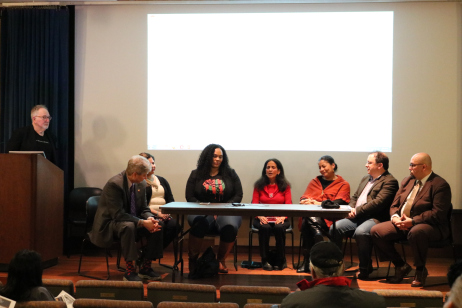Students and panelists held a town hall Tuesday to discuss problems facing students of color, particularly those in the public school education system. The event, titled, “Race and Public Education in NYC: A Town Hall,” introduced a panel of seven educational community leaders of varying backgrounds who took the stage to share insights from their professional experiences and advocate for change.
Aixa Rodriguez, FCRH ’00, GSE ’05, organized the panel in response to another event that she attended on race and education, which did not include any discussion of the Bronx. Mark Naison, Ph.D., professor of history and African American studies, moderated the event in a two-part approach. Each panelist was invited to talk about his or her particular experience and focus on activism followed by a dialogue between the audience in attendance and the panelists.
The panel consisted of Luis E. Torres, principal of P.S. 55 in Claremont Village in the Bronx.” Daniel Katz, teacher, member of Community Education Council 3’s zoning comittee. Fabienne Doucet, Ph.D., associate professor of early childhood education at New York University. Ruth Rodriguez, former teacher, mother and administrator for United Opt Out National. Pamela Lewis, FCRH ’03, author of Teaching While Black: A New Voice on Race and Education in New York City (Fordham University Press, 2016). Kaliris Salas-Ramirez, Ph.D., assistant medical professor at the City University of New York, mother and activist and Arthur Goldstein, ESL teacher and United Federation of Teachers chapter leader at Francis Lewis High School in Queens.
Rodriguez commented on the diversity of the panels’ backgrounds.
“The members of tonight’s panel each can speak to a piece of the puzzle, which is why we asked them here,” said Rodriguez.
The panel spoke of the problems students of color face in the public school system, due to governmental short comings, such as standardized testing and grading schools without looking at community variables. Panelists also addressed the lack of understanding of the role education plays in lower income communities.
The panel’s message reached further than the various community leaders in attendance to Fordham undergraduates.
“I have been tutoring young African American kids in my town, Mount Vernon, and I just wanted to learn a better way of how I could reach out to them and make a better impression on them,” said Arnell Stewart, FCRH ’20. “I feel like tonight has definitely helped me to learn how to better communicate with them, learn about the different systems that a lot of kids are exposed to.”
Anya Patterson, FCRH ’19, echoed this approval of the panel’s activism and role in educating her further on the issues facing students of color in pre-collegiate education.
“A forum on race in public education in New York City, learning how I can be a better community organizer and/or activist, how can I be an agent of change in this community as an undergraduate,” said Patterson, “and just be a person who is affecting change, I think that was my main goal in coming here. It was great.”





